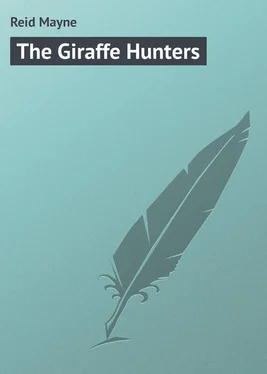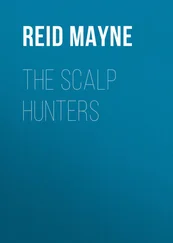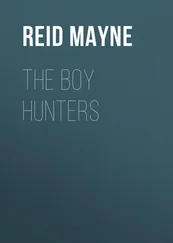Mayne Reid - The Giraffe Hunters
Здесь есть возможность читать онлайн «Mayne Reid - The Giraffe Hunters» — ознакомительный отрывок электронной книги совершенно бесплатно, а после прочтения отрывка купить полную версию. В некоторых случаях можно слушать аудио, скачать через торрент в формате fb2 и присутствует краткое содержание. Жанр: foreign_language, foreign_prose, на английском языке. Описание произведения, (предисловие) а так же отзывы посетителей доступны на портале библиотеки ЛибКат.
- Название:The Giraffe Hunters
- Автор:
- Жанр:
- Год:неизвестен
- ISBN:нет данных
- Рейтинг книги:3 / 5. Голосов: 1
-
Избранное:Добавить в избранное
- Отзывы:
-
Ваша оценка:
- 60
- 1
- 2
- 3
- 4
- 5
The Giraffe Hunters: краткое содержание, описание и аннотация
Предлагаем к чтению аннотацию, описание, краткое содержание или предисловие (зависит от того, что написал сам автор книги «The Giraffe Hunters»). Если вы не нашли необходимую информацию о книге — напишите в комментариях, мы постараемся отыскать её.
The Giraffe Hunters — читать онлайн ознакомительный отрывок
Ниже представлен текст книги, разбитый по страницам. Система сохранения места последней прочитанной страницы, позволяет с удобством читать онлайн бесплатно книгу «The Giraffe Hunters», без необходимости каждый раз заново искать на чём Вы остановились. Поставьте закладку, и сможете в любой момент перейти на страницу, на которой закончили чтение.
Интервал:
Закладка:
Several oxen were taken along, laden with dried hippopotamus flesh, crushed maize, and other articles of food to be used on the journey. Several cows were also driven along to yield a supply of milk.
One of the pack-horses belonging to our hunters had been placed at the disposal of the chief; and on this he rode, generally keeping close by the side of Groot Willem.
Owing to the nature of the country, and the inability of the oxen for fast travelling, their progress was but slow.
They found plenty of game along the route, but none of it was pursued for the sake of amusement. Only a sufficient quantity was killed to provide the camp with fresh meat, and no time was lost in procuring it, as antelopes were constantly coming within shot of the hunters, as they moved along the line of march.
Only one incident worthy of notice occurred during the journey, in their camp of the sixth night after starting. One of the Makololo had risen to put some fresh fagots on a fire burning near him. Placing his hand upon the ground for the purpose of picking up a piece of wood, he suddenly started back, at the same time uttering a cry of terror.
Several of his companions sprang to their feet; and, for a moment, a scene of confusion ensued that baffled every attempt on the part of the young hunters to obtain an explanation of it. At length, it transpired that a snake had caused the commotion. One of about eight feet in length was dragged up to the light of the fire and submitted to examination. It was writhing in the agonies of death. Its head had been crushed by a blow. Its colour, which was nearly black, left no doubt in the minds of the natives as to the nature of the reptile they had killed.
“Picakholu! picakholu!” exclaimed several at the same time, and their attention was immediately turned to the man who had first made its acquaintance.
He exhibited two deep scratches on the back of his right hand. On beholding them, his companions uttered a cry of commiseration, and stood gazing at the unfortunate man with an expression that seemed to say: “ You must surely die .”
His colour soon changed to a deeper brown. Then his fingers and lips began to move spasmodically, and his eyes assumed a fixed and glassy expression.
In about ten minutes from the time he had been bitten, he seemed quite unconscious of anything but agony; and would have rolled into the fire, had he not been held back by those around him.
In less than half an hour, he was dead, – dead, while the body of the serpent with the mangled head was still writhing along the grass.
The Makololo was buried at sunrise, three hours after death; and so virulent is the poison of the picakholu that, ere the body was deposited in the grave, it was already in a state of decomposition!
Chapter Eighteen.
A Giraffe Chase
In the evening of the twelfth day after leaving the Limpopo, they reached a small river, which Macora called the Luize. He informed the hunters, that one day’s journey down this stream would take him to the ruins of the village where he had been born and had lived until within the last two or three years, and his desire to see his native place was about to be gratified.
On one thing Macora could congratulate himself. The chief Moselekatse, by driving him from his country, had profited but little. All the Makololo cattle and other objects of plunder had been safely got away out of reach of the robber chief. None of Macora’s people had remained in the land, so that there was no one to pay tribute to the conqueror; and the country had been left to the undisturbed possession of the wild beasts.
Macora’s tribe were not now living in a conquered condition; nor were they now prevented from paying a visit to their former home.
The plan proposed by the Makololo chief for catching the young giraffes, was to build a hopo or trap, in some convenient place where a herd of giraffes might be driven into it, – the old ones killed and the young ones secured alive.
No better plan could be devised than this, and it was unanimously adopted.
A site for the hopo has to be chosen with some judgment, so that labour may be saved in its construction; and, satisfied that the chief would act for the best, the hunters determined on leaving to him all the arrangements regarding it.
A suitable place for the trap, Macora remembered having seen, a few miles down the river; and thither they repaired.
On the way, they passed the ruins of the deserted village, and many of the natives recognised amid the heaps of rubbish the places that had once been their homes.
Five miles farther down, they reached the place which was to be enclosed as a hopo. It was a narrow valley or pass, leading from a large forest to the river-bank, – and the variety and quantity of spoor over its surface, proved that most animals of the country daily passed through it.
The forest consisted chiefly of mimosa-trees, whose leaves are the favourite food of the giraffe. Plenty of other timber was growing near, such as would be needed in constructing the required inclosure.
Macora promised that his people should go to work on the following day; when pits should be dug and trees felled for the fence of the hopo.
Willem inquired if they had not better first make sure that giraffes were in the neighbourhood, before expending their labour in constructing the trap. This Macora declared was not necessary. He was quite certain that they would be found by the time the trap was ready for receiving them. He also advised the hunters to refrain from molesting any giraffes they might see before the inclosure should be completed, which, according to his calculation, would be in about two weeks.
The hunters now began to understand the difficulties of the task they had undertaken, and were thankful for the good fortune that had brought them the assistance of the Makololo chief. But for him and his people, it would have been idle for them to have attempted taking the giraffes alive.
Well mounted, they might ride them down and shoot as many as they pleased, but this would have been but poor sport; and even Groot Willem would, in due time, have got tired of it. It was not for this they had come so far.
Next morning, the work of making the hopo was commenced; and to inspire the young hunters with the hope that the labour would not be in vain, Macora showed them the spoor of a drove of giraffes that had visited the river during the night.
The chief would not allow his guests to take any part in the toil, and unwilling to be idle, Groot Willem, Hendrik, and Arend determined on making an excursion down the river.
Hans remained behind, content in the pursuit of his botanical studies, joined to the amusement of killing antelopes, and other game for the use of Macora’s workmen.
Swartboy remained with him.
Wishing to be as little encumbered as possible on an excursion, intended to last only for a couple of days, Willem and his companions took with them but one horse, besides those for the saddle. This was in the care of Congo, who, of course, followed his master, “Baas Willem.”
Nothing could be more beautiful than the scenes passed through on the first day of their hunt. Groves of palms, and other trees, standing over flower-clad plains on which gnoos, hartebeests, and other antelopes were browsing in peace. A flock of gayly-plumaged birds seemed at home in every tree; and everything presented to their view was such as fancy might paint for a hunter’s paradise. On that day, our adventurers had their first view of the lordly giraffe. Seven of those majestic creatures were seen coming from some hill that stretched across the plain.
“Don’t move,” exclaimed Hendrik, “and perhaps they will stray near enough for us to get a shot before we are discovered.”
Читать дальшеИнтервал:
Закладка:
Похожие книги на «The Giraffe Hunters»
Представляем Вашему вниманию похожие книги на «The Giraffe Hunters» списком для выбора. Мы отобрали схожую по названию и смыслу литературу в надежде предоставить читателям больше вариантов отыскать новые, интересные, ещё непрочитанные произведения.
Обсуждение, отзывы о книге «The Giraffe Hunters» и просто собственные мнения читателей. Оставьте ваши комментарии, напишите, что Вы думаете о произведении, его смысле или главных героях. Укажите что конкретно понравилось, а что нет, и почему Вы так считаете.












